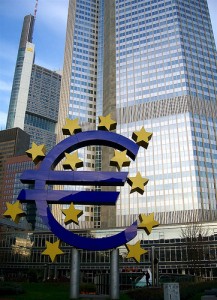Posted on 19 April 2011. Tags: advisory panel, economic recovery, emerging market economies, finance minister, financial stability, global economy, jager, obama, potholes, sovereign debt
 The United States was castigated by world finance leaders on Saturday because of its inadequate actions to lessen its large budget deficits. Finance leaders said monetary constraints in rich countries such as the United States can largely jeopardize global recovery.
The United States was castigated by world finance leaders on Saturday because of its inadequate actions to lessen its large budget deficits. Finance leaders said monetary constraints in rich countries such as the United States can largely jeopardize global recovery.
On Saturday, finance ministries were in Washington for its semi-annual meeting. This time, they have discussed more about the $14 trillion debt accumulated by the United States.
Most of the emerging market economies, which took part in the meeting, criticized the actions of the United States. However, some advanced nations reinforced the talks as well.
According to Dutch finance minister Jan Kees de Jager, if advanced nations act too slowly to reduce massive financial deficits, this could further lead to more sustainability issues and weaken the outlook of global economy. He said debt dynamics in other advanced economies together with the United States are of major concern.
The International Monetary Fund said that the U.S. budget deficit was about to reach 10.8 percent of the nation’s economic output this year. The federal country ties with Ireland for the highest deficit-to-GDP ration among several other advanced economies.
The committee’s advisory panel on Saturday said that concerns for financial stability, as well as sovereign debt stability must be addressed. It said credible actions must be made to push progress.
The House of Representatives, led by the Republican party, approved a plan on Friday to cut spending by about $6 trillion over a decade and slash benefits for the poor and elderly.
President Barach Obama, who offered plans to reduce deficits by $4 trillion over 12 years, said on Thursday that the plan of the Republicans would just create a nation of potholes. The administration is worried about cutting budget spending sharply while economic recovery remains volatile.
Posted in Finance
Posted on 04 February 2011. Tags: 10 year bonds, angela merkel, chancellor angela merkel, contagion, debt crisis, deputy finance minister, economic organization, french president nicolas, president nicolas sarkozy, sovereign debt
 France and Germany have reached an agreement to make further steps to enhance economic organization within the euro zone as part of a comprehensive anti-crisis package. the package will also ascertain that Europe’s bailout fund is now strengthened.
France and Germany have reached an agreement to make further steps to enhance economic organization within the euro zone as part of a comprehensive anti-crisis package. the package will also ascertain that Europe’s bailout fund is now strengthened.
Officials in Germany said on Wednesday that Chancellor Angela Merkel and French President Nicolas Sarkozy will give combined proposals to boost policy coordination in the 17-nation bloc on Friday at an EU summit in Brussels.
Sending the strongest signal yet, German Deputy Finance Minister said that Berlin is ready to give new powers to the euro zone’s rescue fund to swap for fiscal discipline commitments by other members.
Asmussen told at a conference in Frankfurt that they will do all that is required to keep the stability of the entire euro zone and that might include changing the scope and efficiency of the EFSF. He was referring to the 440 billion euro European Financial Stability Facility.
The final agreement on the new scheme for battling the euro zone’s sovereign debt crisis is not yet expected before the March 24-25 summit.
However, markets are already welcoming signs that leaders in Europe are zeroing in on an agreement to stop contagion from Greece and Ireland to susceptible countries like Portugal and Spain.
In the past three weeks, the euro has gained 7 percent on the dollar to trade over $1.38 for the first time since early November. The Spanish and Greek risk premiums on its 10-year bonds are still on three-month lows.
The spreads between Irish Bonds and German benchmarks also narrowed on Wednesday. But, it was a relief that a ratings downgrade from Standard & Poor’s was not profound.
Posted in Featured News, Finance
Posted on 25 January 2011. Tags: bgc partners, bonds, governments, inflationary pressures, moderate pace, policymakers, public finances, sovereign debt, steady pace, united front
 The euro wandered back from two-month highs in opposition to dollar on Monday as traders reported recent profits amid the evidence that the eurozone economy has commenced the year at a moderate pace towards recovery.
The euro wandered back from two-month highs in opposition to dollar on Monday as traders reported recent profits amid the evidence that the eurozone economy has commenced the year at a moderate pace towards recovery.
Stocks changed narrowly in front of a new batch of earnings, particularly out of the United States despite the expectations that China will shortly tighten monetary policy to put a stop on rising inflationary pressures.
However, the most significant developments in the market are centered on the euro currency that recently reached $1.3646, which is its highest rate since November 22. The increase proved to be a sign for investors to reserve some recent gains. Two weeks ago, the euro was trading at $1.2875, which is its four-month low.
The euro’s increase is a result mainly of the declining concern over Europe’s debt crisis despite the signals from policymakers that a widespread agreement is currently discussed which will help raise their firefighting powers, as well as financial muscle.
According to David Bulk, markets analyst at BGC Partners, bonds have responded positively as the EU continues to try to adopt a more united front towards sovereign debt issues. The data released on Monday further proves that the entire eurozone economy continues to grow at a reasonably steady pace.
But, while the headline figures represent that the eurozone economy is in a fairly good condition, they cover wide differences between countries. Germany, which is Europe’s biggest economy, continues to power ahead while other countries such as Ireland, Greece and Portugal lag behind as their governments continue painful sternness programs to put their public finances in good shape.
Posted in Finance
 The United States was castigated by world finance leaders on Saturday because of its inadequate actions to lessen its large budget deficits. Finance leaders said monetary constraints in rich countries such as the United States can largely jeopardize global recovery.
The United States was castigated by world finance leaders on Saturday because of its inadequate actions to lessen its large budget deficits. Finance leaders said monetary constraints in rich countries such as the United States can largely jeopardize global recovery.
 France and Germany have reached an agreement to make further steps to enhance economic organization within the euro zone as part of a comprehensive anti-crisis package. the package will also ascertain that Europe’s bailout fund is now strengthened.
France and Germany have reached an agreement to make further steps to enhance economic organization within the euro zone as part of a comprehensive anti-crisis package. the package will also ascertain that Europe’s bailout fund is now strengthened. The euro wandered back from two-month highs in opposition to dollar on Monday as traders reported recent profits amid the evidence that the eurozone economy has commenced the year at a moderate pace towards recovery.
The euro wandered back from two-month highs in opposition to dollar on Monday as traders reported recent profits amid the evidence that the eurozone economy has commenced the year at a moderate pace towards recovery.